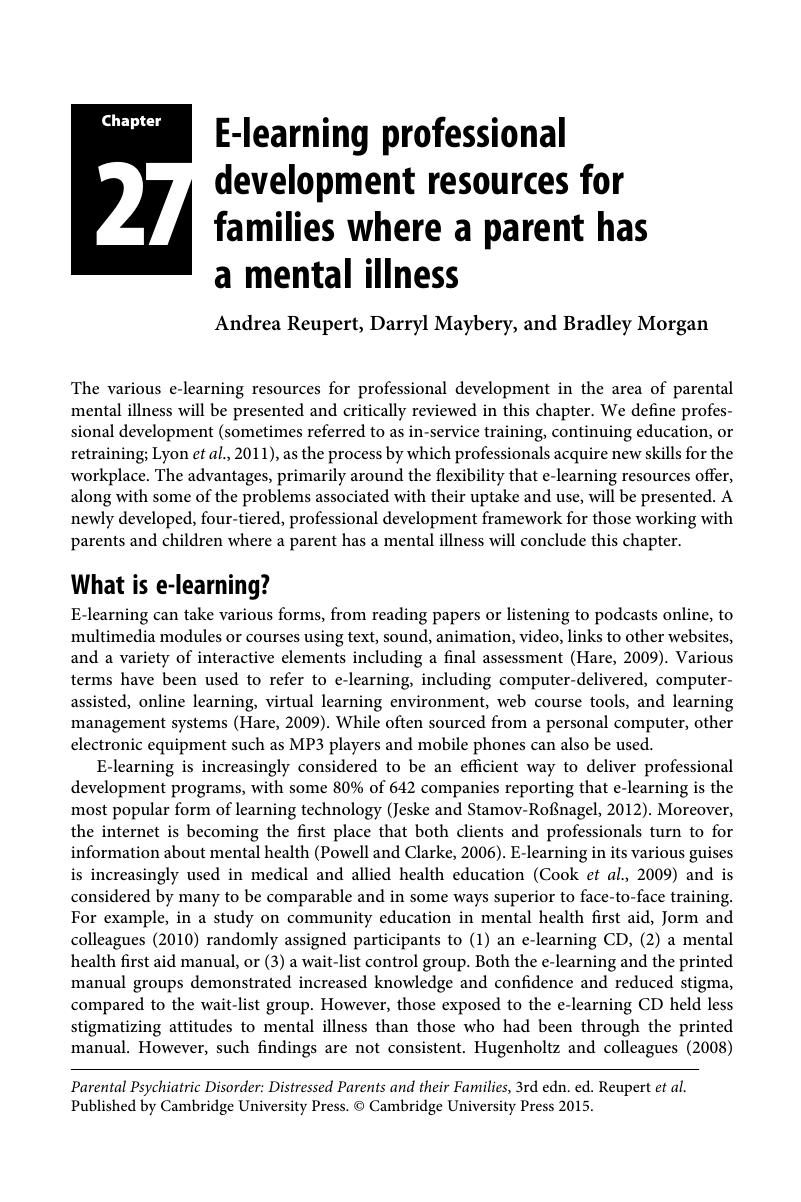Book contents
- Parental Psychiatric DisorderDistressed Parents and Their FamiliesThird edition
- Parental Psychiatric Disorder
- Copyright page
- Contents
- Contributors
- Preface
- Section 1 Fundamental issues
- Section 2 Comprehensive assessment
- Section 3 Specific disorders: the impact on children, parenting, and family relationships
- Section 4 Child, parent, and family interventions
- Section 5 Building workforce, organizational, and community capacity
- Chapter 26 Parental psychiatric disorder: translating The Family Model into practice change
- Chapter 27 E-learning professional development resources for families where a parent has a mental illness
- Chapter 28 How can we make the psychiatric workforce more family focused?
- Chapter 29 A personal recovery model for parents with mental health problems
- Chapter 30 Helping parents with mental illness: the value of professional partnerships fighting de facto bias in the American courts
- Chapter 31 Preventing unnecessary loss of child custody
- Chapter 32 Shifting the intervention paradigm from individuals to families living with parental mental illness
- Chapter 33 The policy context and change for families living with parental mental illness
- Chapter 34 Are we there yet? Developing a conceptual framework for understanding families where a parent has a mental illness
- Index
- References
Chapter 27 - E-learning professional development resources for families where a parent has a mental illness
from Section 5 - Building workforce, organizational, and community capacity
Published online by Cambridge University Press: 05 July 2015
- Parental Psychiatric DisorderDistressed Parents and Their FamiliesThird edition
- Parental Psychiatric Disorder
- Copyright page
- Contents
- Contributors
- Preface
- Section 1 Fundamental issues
- Section 2 Comprehensive assessment
- Section 3 Specific disorders: the impact on children, parenting, and family relationships
- Section 4 Child, parent, and family interventions
- Section 5 Building workforce, organizational, and community capacity
- Chapter 26 Parental psychiatric disorder: translating The Family Model into practice change
- Chapter 27 E-learning professional development resources for families where a parent has a mental illness
- Chapter 28 How can we make the psychiatric workforce more family focused?
- Chapter 29 A personal recovery model for parents with mental health problems
- Chapter 30 Helping parents with mental illness: the value of professional partnerships fighting de facto bias in the American courts
- Chapter 31 Preventing unnecessary loss of child custody
- Chapter 32 Shifting the intervention paradigm from individuals to families living with parental mental illness
- Chapter 33 The policy context and change for families living with parental mental illness
- Chapter 34 Are we there yet? Developing a conceptual framework for understanding families where a parent has a mental illness
- Index
- References
Summary

- Type
- Chapter
- Information
- Parental Psychiatric DisorderDistressed Parents and their Families, pp. 288 - 300Publisher: Cambridge University PressPrint publication year: 2015
References
- 12
- Cited by



